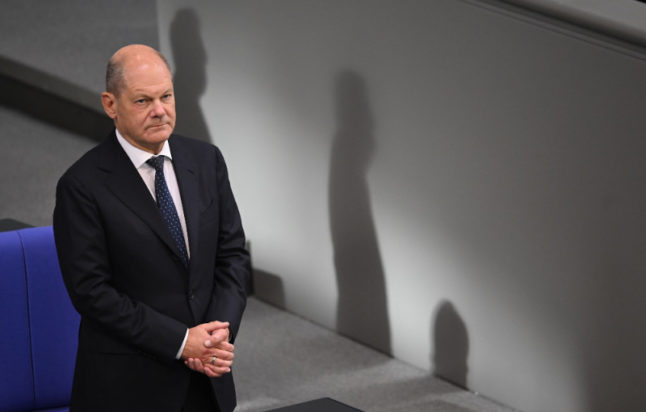“I ask for the support of all citizens so that together we can guarantee the safety of our Jewish fellow citizens, and to do this we must show solidarity with them,” Scholz said on ARD television.
“We can’t accept it,” he said of anti-Semitic messages heard at pro-Palestinian demonstrations held in Germany since Hamas’s deadly attack on Israel at the weekend, which led to Israel’s massive retaliation in the Gaza Strip.
READ ALSO: Germany prepares to evacuate thousands of citizens from Israel
Despite a ban on such demonstrations, around a hundred people gathered in Berlin’s Neukölln district on Wednesday evening in support of the Palestinians, in a tense atmosphere surrounded by a heavy police presence.
The rally had been banned by the police as “a danger to public safety and order”.
The Bild tabloid also reported incidents on Wednesday evening on the margins of a demonstration in support of Israel in Chemnitz, eastern Germany.
Several dozen people with Palestinian flags attacked some demonstrators with Israeli flags, witnesses told the newspaper.
On Saturday, the day of the Hamas offensive against Israel, Berlin police reported people “celebrating the attacks on Israel by distributing pastries” in the Neukölln district.
The same evening, a pro-Palestinian rally was dispersed because of anti-Israeli slogans, according to the police.
Both actions were relayed on X, formerly Twitter, by the German account of the “Palestinian Prisoner Support Network” Samidoun, which hailed the Hamas attack as an act of “resistance”.
Since the Hamas attack in Israel, Germany has stepped up protection around the country’s Jewish institutions.
On Thursday morning, Scholz said that Germany pledged Israel its full support in the conflict with Hamas militants, saying Berlin’s “only place” right now was at Israel’s aide.
“For Germany at the moment, the only place is at Israel’s side,” Scholz said in a speech to parliament.
“Our own history, our responsibility stemming from the Holocaust, make it an everlasting duty to stand up for the existence and security of the state of Israel.”




 Please whitelist us to continue reading.
Please whitelist us to continue reading.
Member comments